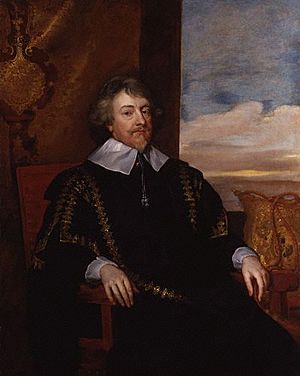John Finch, 1st Baron Finch facts for kids
Quick facts for kids
The Lord Finch
|
|
|---|---|

Portrait by Anthony van Dyck
|
|
| Lord Keeper of the Great Seal | |
| In office 1640–1641 |
|
| Preceded by | The Lord Coventry |
| Succeeded by | Sir Edward Littleton |
| Chief Justice of the Common Pleas | |
| In office 1634–1640 |
|
| Preceded by | Sir Robert Heath |
| Succeeded by | Sir Edward Littleton |
| Speaker of the House of Commons | |
| In office 1628–1629 |
|
| Preceded by | Sir Heneage Finch |
| Succeeded by | Sir John Glanville |
| Personal details | |
| Born | 17 September 1584 |
| Died | 27 November 1660 (aged 76) |
| Alma mater | Emmanuel College, Cambridge |
John Finch, 1st Baron Finch (born 17 September 1584 – died 27 November 1660) was an important English judge and politician. He served in the House of Commons, which is like a parliament, at different times between 1621 and 1629. He also held the important role of Speaker of the House of Commons.
Contents
Early Life and Education
John Finch was born on 17 September 1584. His father was Sir Henry Finch, who lived in Eastwell, Kent.
John Finch went to Emmanuel College, Cambridge in 1596. Later, he studied law at Gray's Inn, starting in 1601. He became a lawyer in November 1611.
Political Career Highlights
Finch began his public service as the recorder of Canterbury in 1619. A recorder was a legal officer in a town.
In 1621, he was chosen to be a Member of Parliament for Canterbury. This meant he represented the people of Canterbury in the House of Commons.
When King Charles I visited Canterbury for his wedding in 1625, Finch welcomed him. The King was so pleased that he made Finch a knight on 15 June 1625. In 1626, Finch became a King's Counsel, a special title for experienced lawyers.
He was re-elected as an MP for Canterbury in 1626 and again in 1628. In 1628, Finch was elected Speaker of the House of Commons. This role meant he was in charge of leading the debates and keeping order in Parliament. He stayed Speaker until 1629, when Parliament was closed down by the King. During this time, there was a big disagreement in Parliament about taxes. Some members, like Denzil Holles, strongly opposed the King's policies.
Judicial Career and Challenges
In 1634, Finch was made the chief justice of the Court of Common Pleas. This was a very high position in the legal system. He was known for strongly supporting the King's power and decisions in court.
One of the most famous cases Finch oversaw was the trial of John Hampden. Hampden refused to pay a tax called ship money. This tax was usually only collected during wartime to build ships, but King Charles I was collecting it all the time. Finch and the other judges decided that the ship money tax was legal, which helped the King.
Because of his loyalty and support for the King, Finch received more rewards. In 1640, he was appointed Lord Keeper of the Great Seal of England. This was a very important job, like being the King's chief legal advisor. He was also given the title Baron Finch, of Fordwich, making him a lord.
However, many people in England did not like Finch because of his strong support for the King's actions. When the Long Parliament met in 1640, one of their first actions was to accuse him of serious wrongdoing. This process is called impeachment. To avoid being arrested, Finch fled to Holland. His property was taken by the government. The Great Seal was then given to Edward Littleton.
It is not clear exactly when Finch returned to England. But in 1660, after the King was restored to power, Finch was part of a group of commissioners who judged those who had been involved in the execution of King Charles I. He did not play a major role in these trials.
John Finch died on 27 November 1660, at the age of 76. He was buried in St Martins church near Canterbury. His title of Baron Finch ended when he died, as he had no children to inherit it.
See also
- Earl of Winchilsea
- Heneage Finch, 1st Baron Finch
 | Sharif Bey |
 | Hale Woodruff |
 | Richmond Barthé |
 | Purvis Young |

